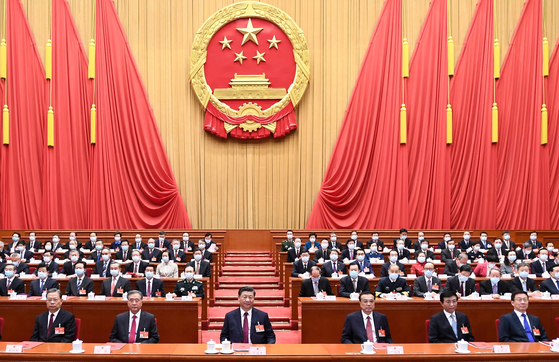![The two meetings, China's largest political event held at the People's Congress in Beijing, China, closed on the 11th. Standing in the front row of the political bureau, China's highest leadership. From left, Secretary of the Central Discipline Prosecutor's Office, Wang Yang, Chairman of the National People's Political Council, President Xi Jinping, Prime Minister Li Keqiang, Secretary of the Central Secretariat of the Wang Huning Party, and Deputy Prime Minister Han Han Han. [신화통신=연합]](https://i0.wp.com/pds.joins.com/news/component/htmlphoto_mmdata/202103/12/5ec6206a-1180-4623-b0c9-a85534f48c08.jpg?w=560&ssl=1)
The two meetings, China’s largest political event held at the People’s Congress in Beijing, China, closed on the 11th. Standing in the front row of the political bureau, China’s highest leadership. From left, Secretary of the Central Discipline Prosecutor’s Office, Wang Yang, Chairman of the National People’s Political Council, President Xi Jinping, Prime Minister Li Keqiang, Secretary of the Central Secretariat of the Wang Huning Party, and Deputy Prime Minister Han Han Han. [신화통신=연합]
The biggest issue of the National People’s Congress of China (Non-in University), which closed on the 4th, was the revision of the Hong Kong election law. At the same time, however, a bill was passed that hinted at a significant change in the Chinese power landscape. It is the NPC organization method.
The NPC Organization Act was revised in 39 years
Deputy Prime Minister and State Council Member Appointment and Dismissal to the Standing Committee
Weak prime minister power and strengthen presidential power
“Three consecutive years in mind… Strategies for securing friendly forces”
The NPC Organization Act has never been amended since 1982. Once a year, at the NPC, which is usually held in March every year, the constitution and law are revised, the election of the state president and the prime minister, and budget deliberation and ratification are carried out. It has the highest legal status and decision-making power in China.
![The revised bill of the NPC Organization Act was passed in both meetings. This is the first time in 39 years since 1982. [전인대 홈페이지 캡쳐]](https://i0.wp.com/pds.joins.com/news/component/htmlphoto_mmdata/202103/12/dd11c8ea-4702-4a5c-9d67-37a1e9743f18.jpg?w=560&ssl=1)
The revised bill of the NPC Organization Act was passed in both meetings. This is the first time in 39 years since 1982. [전인대 홈페이지 캡쳐]
However, in 39 years at both meetings, the NPC Organization Act was revised. A total of 37 provisions have been revised or added, and the most notable part is the strengthening of the powers of the NPC Standing Committee.
According to Article 25 of the Amendment, the standing committee may decide the appointment and dismissal of members of the State Council during the closing period of the NPC under the nomination of the Prime Minister of the State Council (government). This includes the Vice Prime Minister and members of the State Council. In addition, Article 26 stipulated that they could withdraw their duties at the request of the Prime Minister. At the request of the President of the Central Military Commission, the military members could be deprived of their duties.
This is to ensure that high-ranking personnel, who had previously had to go through NPC, can be achieved through the standing committee. Unlike the NPC, the standing committee is held every two months by default, and there are about 170 standing members. This means that the appointment and dismissal of high-ranking positions has become relatively easy.
![President Xi Jinping and Prime Minister Li Keqiang are voting on amendments to the Hong Kong election. [UPI=연합]](https://i0.wp.com/pds.joins.com/news/component/htmlphoto_mmdata/202103/12/3b6c4639-e60d-457d-916b-8ea9be6e506d.jpg?w=560&ssl=1)
President Xi Jinping and Prime Minister Li Keqiang are voting on amendments to the Hong Kong election. [UPI=연합]
Chinese media outlet Doo Wei analyzed that the amendment reflects the subtle redistribution of power between the standing chairman of Jeon In-dae and the Prime Minister of the State Council. China’s highest leadership is followed by President Xi Jinping, prime minister Li Keqiang, followed by Li Zan-su, the standing chairman of Jeon In-dae, in that order. As the highest authority, the basic position of the NPC electing and overseeing the main executives of the State Council remains unchanged, but some of the authority has been transferred to the standing chairman of the NPC.
![Ri Jansu, chairman of the Standing Committee of the National People's Congress of China, declares the closing of the two sessions. [신화통신=연합]](https://i0.wp.com/pds.joins.com/news/component/htmlphoto_mmdata/202103/12/3011636e-e2f6-4865-b21e-a4f07be6e74c.jpg?w=560&ssl=1)
Ri Jansu, chairman of the Standing Committee of the National People’s Congress of China, declares the closing of the two sessions. [신화통신=연합]
It is predicted that the standing chairman will have the right to appoint and supervise executives below the prime minister, thereby strengthening his influence on the prime minister. The weakening of Prime Minister In-Jain Lee’s power naturally leads to the strengthening of the influence of President In-Jain Lee. This is the trend that has continued since President Xi took office.
Dooway said that there are also evaluations that the change of authority of the NPC could be more efficient in arranging personnel prior to the 20th party conference. The 20th Party Congress is scheduled to be held in October next year. At this time, it is decided whether President Xi will continue to serve as the third line. In a situation where the succession structure has not yet been revealed, the structure in which the executives of key positions can be decided by the standing committee is that it can secure the diversity of personnel related to the succession of power.
Beijing = correspondent Park Seong-hun [email protected]
![]()
